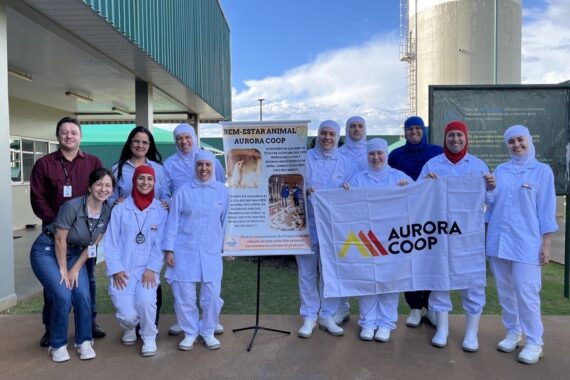Animal welfare
Reuse of PET Bottles as Environmental Enrichment for Broiler Chickens

Pif Paf Alimentos, with a foundation in animal protein production, emphasizes respect for its production species, prioritizing practices aimed at continually improving the quality of life of animals and adhering to the five freedoms of Animal Welfare.
Aligning the 5 R’s of Sustainability with Animal Welfare, a campaign under the “Sustentar Program” was implemented. This program associates the concept of reusing plastic packaging with environmental enrichment, intending to strengthen sustainability practices across Pif Paf Alimentos’ entire value chain.
Environmental enrichment is a technique that seeks ways to reduce the stress of animals raised in intensive systems. Various materials can be used for environmental enrichment for chickens, including perches.
Innovatively, Pif Paf Alimentos chose to use PET bottles to create environmental enrichment, due to their ease of acquisition, practicality, and low cost. The PET bottles used in this initiative were collected through an internal collection campaign with the company’s employees, aimed at raising awareness and encouraging the importance of reusing waste, educating about fighting plastic pollution, and developing the concept of environmental enrichment.
To ensure the collection of PET bottles, corporate communications and actions were carried out to foster the engagement of all company employees involved in the campaign.
The technical area defined the necessary requirements for the insertion of the environmental enrichment bottles according to the objects’ operation mode, aiming to ensure efficiency, according to the animals’ production phase.
The number of bottles inserted per animal was defined according to the requirements of good Animal Welfare production practices, using 1 bottle for every 1,000 broilers. It was determined that the packaging should be between 1.5 and 2.5 liters, as bottles below or above this size would hinder access by the animals. The used bottles are transparent, and inside them contain water with edible dye, in blue, green, red, and yellow.
The insertion of the objects in the farms was done at the eye level of the animals, using strings and/or sisal ropes. It is known from literary references that chicken have a broader vision than humans for certain colors, and this attractiveness was the strategy used for the success of the environmental enrichment.
Animals that receive environmental enrichment are routinely evaluated regarding their preference for the enrichments offered to ensure the method’s efficiency. Pif Paf Alimentos has 100% of its field technicians trained in Animal Welfare available to assist in the handling of deviations.
Notably, the broilers show interest and curiosity in the repurposed packaging, ensuring less occurrence of negative behaviors, such as cannibalism, which has been observed in the production chain.
These instruments, for pecking by birds with colored liquids inside, have been gradually implemented in the company’s breeding environments, and positive results have been frequently appearing.
To date, more than 12,000 bottles have been collected. If not recycled, according to the Brazilian Institute of Environment and Renewable Natural Resources (Ibama), these could take between 200 to 600 years to decompose in nature.
READ TOO

Environment
23/04/2025
C.Vale recognized with three awards at the 2024/25 Estadão Empresas Mais
Cooperative earns national recognition for innovation, sustainability, and performance in agribusiness C.Vale stood out as one of the top honorees at the […]
Read more
Animal welfare
27/05/2024
Poultry unit achieves excellence in animal welfare
Aurora Coop – one of the largest agro-industrial conglomerates in the country – was one of the first Brazilian companies to join […]
Read more
Sectoral Data
02/10/2023
Brazil is set to break records in chicken meat production and exports
The Brazilian Animal Protein Association (ABPA) updated its data and projected records for chicken meat production and exports for 2023. According to […]
Read more
